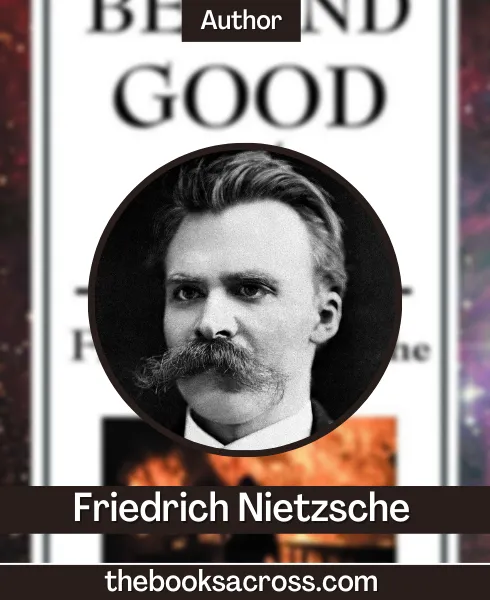Beyond Good and Evil PDF is a philosophical book written by Friedrich Nietzsche and was first published in 1886 by C. G. Naumann. The book is a collection of aphorisms, in which Nietzsche presents his critical views on traditional morality, religion, and philosophy.
The book received mixed reviews upon its release, with some critics calling it incomprehensible and others recognizing its brilliance. However, over time, it has become widely regarded as one of Nietzsche’s most important works and a classic of modern philosophy.
One of the main themes of Beyond Good and Evil is the rejection of traditional morality and the idea that there are universal, objective truths. Nietzsche argues that morality is a product of human culture and is therefore subject to change and reinterpretation. He also criticizes Christianity, which he sees as a manifestation of a slave morality that values meekness and self-denial over strength and self-assertion. Beyond Good and Evil is available in a variety of formats, including paperback, hardcover, ebook, and audiobook.
Table of Contents
Beyond Good and Evil Summary
In the opening aphorisms, Nietzsche introduces his idea of a “master morality,” which values strength, self-assertion, and individualism, and contrasts it with the “slave morality” of Christianity, which he sees as promoting meekness, humility, and self-denial. He argues that the “slave morality” is a response to the triumph of the “master morality” and that it has created a culture of weakness and mediocrity.
Throughout the book, Nietzsche argues that there is no objective truth or universal morality. He claims that all values and beliefs are relative and subjective and that individuals must create their own values based on their own experiences and perspectives. He calls this process of creating one’s own values the “will to power.”
Nietzsche also critiques the idea of the “ascetic ideal,” which he sees as a form of self-denial and repression that denies the individual’s will to power. He argues that the pursuit of pleasure, creativity, and self-expression is a more fulfilling and meaningful way to live.
In the latter part of the book, Nietzsche discusses his views on art, science, and philosophy. He argues that art is a more authentic expression of the human spirit than science, which he sees as a tool of the will to power. He also critiques traditional philosophy, which he sees as too concerned with abstract concepts and not grounded in the realities of life.
Details of Beyond Good and Evil Book
| Book | Beyond Good and Evil |
| Author | Friedrich Nietzsche |
| Original language | German |
| Originally published | 1886 |
| Category | Fiction, Reference work |
| Publisher | Simon & Schuster |
| Total Pages | 117 |
| Format | PDF, ePub |
Multiple Languages Editions of Beyond Good and Evil Book
Beyond Good and Evil has been translated into many languages, including English, German, French, Spanish, Russian, and Chinese. It is widely available in bookstores and online in these and many other languages.
| Book Editions | Check Now |
|---|---|
| English | Check Price |
| German | Check Price |
| Spanish | Check Price |
| Arabic | Check Price |
| Japanese | Check Price |
About the Author
Friedrich Nietzsche (1844-1900) was a German philosopher, cultural critic, and poet, and is widely considered to be one of the most influential thinkers of modern Western philosophy. Nietzsche was born in the town of Röcken in Germany and grew up in a family of Protestant clergymen.

After studying classical philology at the University of Bonn and the University of Leipzig, Nietzsche became a professor of philology at the University of Basel in Switzerland. However, due to health problems and disagreements with the academic establishment, Nietzsche resigned from his professorship in 1879 and devoted himself to writing.
Nietzsche’s writings are characterized by their originality, creativity, and critical engagement with the dominant ideas and values of his time. His works include Thus Spoke Zarathustra, The Genealogy of Morals, and Beyond Good and Evil. Nietzsche’s ideas were highly controversial and often misunderstood during his lifetime, but they have since had a profound influence on modern thought in areas such as existentialism, postmodernism, and critical theory.
In addition to his work as a philosopher, Nietzsche was also an accomplished poet and composer. He suffered a mental breakdown in 1889 and spent the rest of his life in the care of his sister, who edited and published many of his works after his death in 1900.
Beyond Good and Evil PDF Free Download
Click on the download button below to get a pdf file of the Beyond Good and Evil book.
Similar Books to Beyond Good and Evil Book
- The Genealogy of Morals by Friedrich Nietzsche
- Thus Spoke Zarathustra by Friedrich Nietzsche
- The Will to Power by Friedrich Nietzsche
- The Birth of Tragedy by Friedrich Nietzsche
- Critique of Pure Reason by Immanuel Kant
- The Gay Science by Friedrich Nietzsche
- Meditations by Marcus Aurelius
- Ethics by Baruch Spinoza
FAQs(Frequently Asked Questions)
What is the book Beyond Good and Evil about?
Beyond Good and Evil is a philosophical book that challenges traditional ideas about morality, religion, and philosophy.
Is Beyond Good and Evil a difficult read?
Beyond Good and Evil can be a difficult read due to its complex and abstract ideas and the use of aphorisms.
Is Beyond Good and Evil a good read?
Beyond Good and Evil is a highly regarded and influential work, but its value as a “good read” is subjective and depends on the reader’s interests and preferences.
Is Beyond Good and Evil a good book for beginners?
Beyond Good and Evil may not be the best book for beginners due to its complexity and the need for some background knowledge of philosophy.
What is the main theme of Beyond Good and Evil?
The main theme of Beyond Good and Evil is the rejection of traditional morality and the idea that there are no universal, objective truths.







